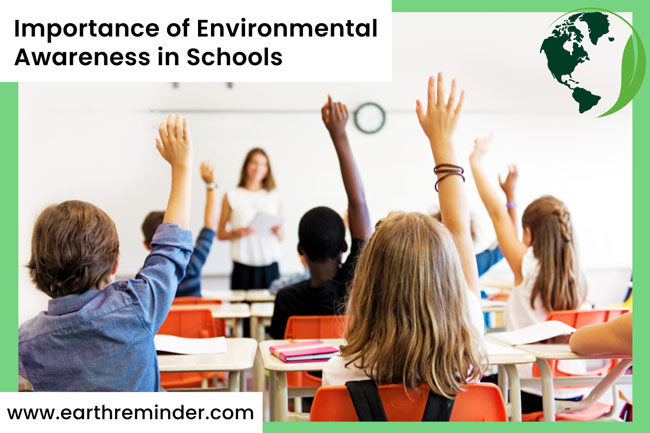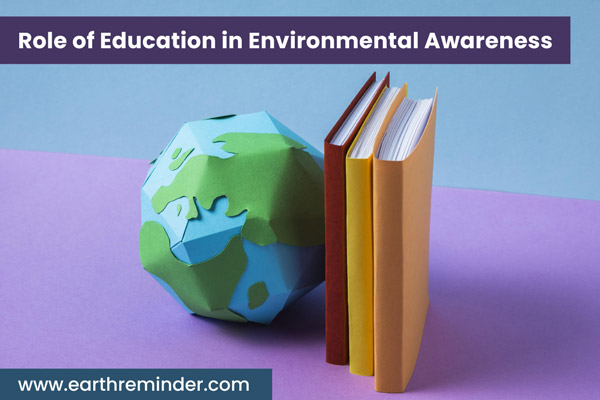Why Is Environmental Awareness Important?
In a world where environmental degradation is a growing concern, it’s more critical than ever for people to understand the importance of environmental awareness and the role of education in it.
Environmental awareness involves understanding and appreciating the natural world and the challenges we face in protecting it. It focuses on learning how all living things are interconnected and the need to preserve the planet for the next generations. A deep understanding of the environment can help people minimize their personal environmental impact. This includes reducing waste, conserving resources, and getting involved in environmental protection and restoration projects.
Table of Contents
Why Is Environmental Awareness Important?
Human activities such as pollution, deforestation, and over consumption can have negative impacts on the environment. These activities can lead to environmental degradation, resulting in serious consequences for humans and the environment, such as climate change, habitat loss, and resource depletion. It is for this reason that environmental awareness is so important.
Most people are unaware of the various ways in which they can help the environment. It is important to be environmentally aware so we can do our part in preserving our planet. There are many things we can do to be more environmentally conscious, such as recycling, using less water, and using energy-efficient appliances.
Environmental awareness is important because our earth provides resources that are essential to our well-being and quality of life. These resources include clean air, water, and soil, as well as a wide range of plants and animals that contribute to the richness and diversity of our planet.
Another reason why environmental awareness is so crucial is that it can help people live healthier lives. People can protect themselves and their families from health risks by learning about the dangers of air pollution, water contamination, and toxic chemicals.
Our environment is not only essential for our survival but also home to a variety of animal and plant species. Due to human activity, many species are at risk of extinction, and this loss of biodiversity can have a serious negative impact on ecosystems.
By raising awareness of these environmental issues, we can help protect these vulnerable species and preserve the natural resources of our earth for future generations. Moreover, being more environmentally aware could help to reduce some of the effects of climate change, as well as reduce our impact on the planet. This can help to ensure that the resources and services provided by the earth will continue to be available to us and other living things.
Importance of Environmental Awareness in Schools
Environmental awareness in schools is crucial because it not only enhances students appreciation for our earth, but also promotes healthy behaviors, inspires future leaders, and improves the school environment.
Schools can promote environmental awareness through curriculum integration, outdoor learning opportunities, waste reduction programs, partnerships with local organizations, and hosting related events and activities. This can ultimately lead to a more environmentally conscious and responsible society, which is crucial for the long-term well-being of both humanity and the planet.
Although there exist many ways to promote environmental awareness in schools, here are some of the most effective ones:
- Host Events and Activities: Schools can host events and activities, such as guest speakers, film screenings, or nature festivals, to promote environmental awareness and encourage students to get involved in environmental issues.
- Celebrate Days Dedicated to Environment: There are days in a human calendar that are specially dedicated to the environment and its awareness creation such as World Environment Day on 5th June. We can get the kids to celebrate and understand the importance of such days in the calendar.
- Integrate Environmental Themes into The Curriculum: Incorporating environmental themes into the curriculum can help students learn about the natural world and the impacts that human actions have on the environment. This could include topics such as conservation, renewable energy, and pollution.
- Set an Example: As we know, Actions speak louder than words. We need to be an example for kids so that they can watch and learn from us. For example, Teachers in schools can all plant a tree and make the students follow them.
- Implement Recycling and Waste Reduction Programs: Schools can set up recycling programs and encourage students to reduce waste by using reusable containers and reducing their use of disposable products.
- Encourage Outdoor Learning: Taking students outside to learn about the environment and ecosystem can help to foster a greater appreciation for the environment. This could involve field trips, nature walks, or outdoor science lessons.
- Partner With Local Organizations: Schools can partner with local organizations, such as conservation groups or environmental NGOs, to promote environmental awareness and engage in conservation and restoration efforts.
Role of Education in Environmental Awareness
Environmental education helps individuals understand and address environmental issues, and empowers them to make responsible decisions. Through this process, individuals learn to think critically and creatively about environmental problems and gain the skills and knowledge needed to take action and make a positive impact. As a result, they develop a deeper understanding and appreciation of the world of nature and the role that they play in it.
There are many ways in which education on environmental awareness can empower society, but here are some key benefits:
- It helps students understand how the environment works and how human actions can impact the environment.
- Encourages students to become more aware of the impacts they have on the environment and fosters an understanding of our planet.
- Helps students develop critical thinking and problem-solving skills by providing opportunities to explore and learn about environmental issues.
- Promotes healthy behaviors and habits, such as conserving resources and reducing waste.
- Inspire future leaders and encourage students to take action on environmental issues and work towards solutions.
- Improves the school environment by promoting sustainability and reducing waste.
- Through education, students who learn about sustainable agriculture practices will be able to apply those techniques in their local surroundings.
- Students who study environmental science can develop innovative technologies or draft policies that contribute to environmental protection.
From all this, we can understand that environmental education plays a vital role in promoting environmental awareness and fostering a broader understanding and appreciation of the natural environment.
It can help students develop important skills and behaviors that will enable them to be responsible stewards of the environment and contribute to a more sustainable future.
Conclusion
We have seen the importance of environmental awareness, both for our planet and for us as humans. We need to take ownership of this responsibility to do everything we can to ensure that future generations will live in a clean and safe world.
Educators can implement environmental awareness in schools by hosting events, integrating environmental themes into the curriculum, etc. Educating people about the environment is crucial for saving the planet from the hands of disaster and making it a better place for future generations to live.
People can make a difference through simple lifestyle choices. These include reducing plastic waste, conserving water, choosing sustainable products, turning off lights when not in use, and walking or cycling instead of driving whenever possible.
So, why is environmental awareness important? Well, if we don’t understand the problems our environment faces, it will be difficult for us to take action. If we do not care about the environment, in that case, we are unlikely to make any changes in our own lives that may contribute to the improvement of the environment.


